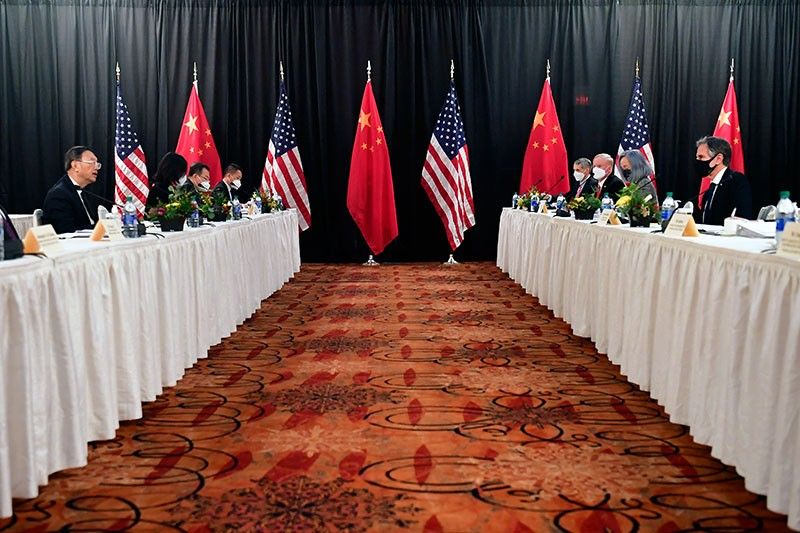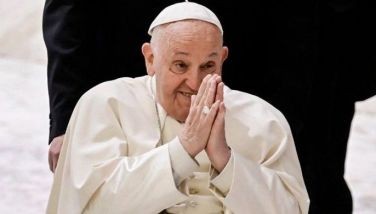Tough talk at first face-to-face US, China meeting in Biden era

ANCHORAGE, United States — US and Chinese diplomats clashed Thursday in their first face-to-face talks since President Joe Biden took office, with the world's top two powers each digging in on a laundry list of issues on which they diverge broadly as the meeting opened in Alaska.
China's actions "threaten the rules-based order that maintains global stability," US Secretary of State Antony Blinken said at the opening of the two-day meeting in Anchorage.
The US side will "discuss our deep concerns with actions by China, including Xinjiang," where Washington has accused Beijing of "genocide" against Uyghur Muslims, Blinken told the Chinese Communist Party's top diplomacy official, Yang Jiechi, and Foreign Minister Wang Yi.
He added that there would be dialogue on "Hong Kong, Taiwan, cyberattacks on the United States, economic coercion toward our allies."
Beijing was equally sharp in its response.
"China is firmly opposed to US interference in China's internal affairs. We have expressed our staunch opposition to such interference, and we will take firm actions in response," Yang warned.
Wang denounced the latest US sanctions against senior Chinese officials over what Washington considers Beijing's quashing of Hong Kong's freedoms, announced on the eve of the talks.
"This is not supposed to be the way one should welcome his guests," Wang said.
'Cold War mentality'
Tensions between Washington and Beijing remain high after relations were pitched into turmoil during Donald Trump's presidency, which saw a damaging trade war and spats over everything from defense to tech and rights in Hong Kong.
With its frigid temperatures and remote, Pacific location, Anchorage was considered a more neutral meeting ground than Washington or Beijing for the three-session talks that finish Friday morning.
But expectations are limited on both sides and the tone set by the opening statement confirmed the depth of the divide between the rivals.
The last meeting in June did nothing to help thaw frosty relations that resembled a new Cold War by the end of Trump's time in office.
Biden has maintained a tough line on China, and Blinken has said it represents America's "biggest geopolitical test of the 21st century."
Still, the Biden team has said it wants to engage diplomatically on the world stage, in a pivot from Trump's isolationist and ally-berating stance, particularly on issues such as climate change, the pandemic and the non-proliferation of weapons.
White House National Security Advisor Jake Sullivan said Thursday that the United States didn't want "conflict," but "we welcome stiff competition."
Yang called on him to "abandon the Cold War mentality," saying Beijing wanted "no confrontation, no conflict."
But visibly stung by the American accusations, he reproached the United States at length, demanding Washington "stop advancing its own democracy in the rest of the world."
Blinken responded: "I have to tell you what I'm hearing is very different from what you described. I'm hearing deep satisfaction that the United States is back, that we're reengaged with our allies and partners.
"I'm also hearing deep concern about some of the actions your government is taking," he added.
A senior Biden administration official in Anchorage accused the Chinese delegation of "grandstanding," and said it was "focused on public theatrics and dramatics over substance."
Bonnie Glaser, director of the China Power Project at the Center for Strategic and International Studies, said the talks would have a limited impact.
"They will probe whether there is common ground on some issues and whether there are ways to manage and even narrow their differences," she told AFP.
"Expectations should remain low. A reset of the relationship is not in the cards."
'Coercion'
Thursday's meeting follows a visit Blinken made to Japan and South Korea, two key US allies in the Asia-Pacific region.
While in Tokyo, Blinken warned China against using "coercion and destabilizing behavior."
Blinken and Defense Secretary Lloyd Austin also attended a key summit between leaders of the so-called Quad alliance, which groups the US, Australia, Japan and India as a check on China's ambitions.
Blinken and allies have criticized China on a slew of issues, including the erosion of autonomy in Hong Kong, tensions around Taiwan and Tibet, the treatment of the Uighur population in Xinjiang, Beijing's sweeping maritime claims in the South China Sea, the theft of intellectual property and a lack of transparency over the origins of Covid-19.
Elizabeth Economy, a senior fellow at Stanford University's Hoover Institution, said that while the Biden administration has moved away from Trump's inflammatory rhetoric, temperatures remain high.
"Honestly, it is difficult to see China changing course on any issue of significance to the United States. We are in a position where our core values and vision of a future world are fundamentally at odds," Economy told AFP. — with Francesco Fontemaggi in Washington
The US decision to disinvite China from upcoming maritime exercises in the Pacific is "non-constructive," China's Foreign Affairs Minister Wang Yi says.
"We find that a very non-constructive move," Wang says at a press conference with Secretary of State Mike Pompeo after the two met in Washington.
"It's also a decision taken lightly and is unhelpful to mutual understanding between China and the US." — Agence France-Presse
The United States accuses China of orchestrating a "concerted" campaign of dangerous and provocative air force maneuvers against US military planes in international airspace, warning such moves could spark inadvertent conflict between the two powers.
The Pentagon says aggressive tactics by Chinese aircraft threatened US planes flying over the East and South China Sea regions, tallying more than 180 such incidents since fall 2021 -- "more in the past two years than in the decade before that," said Ely Ratner, assistant secretary of defense for Indo-Pacific security affairs. — AFP
US Secretary of State Antony Blinken calls on China, a partner of Iran, to use its influence to push for calm in the Middle East after Hamas militants struck Israel, provoking retaliation and fears that violence will spread.
The top US diplomat, who was visiting Saudi Arabia, had a "productive" one-hour telephone call with Chinese Foreign Minister Wang Yi, State Department spokesman Matthew Miller says.
"Our message was that he thinks it's in our shared interest to stop the conflict from spreading." Miller tells reporters on Blinken's plane from Riyadh to Abu Dhabi. — AFP
The US Justice Department says a US Navy petty officer pleaded guilty on Tuesday to providing sensitive military information to a Chinese intelligence officer.
Wenheng Zhao, 26, and another US sailor, Jinchao Wei, were arrested in August on suspicion of spying for China.
Zhao pleaded guilty in a federal court in California to charges of conspiring with a foreign intelligence officer and accepting a bribe, the Justice Department says in a statement. — AFP
The US Justice Department says US Navy petty officer pleaded guilty on Tuesday to providing sensitive military information to a Chinese intelligence officer.
Wenheng Zhao, 26, and another US sailor, Jinchao Wei, were arrested in August on suspicion of spying for China.
Zhao pleaded guilty in a federal court in California to charges of conspiring with a foreign intelligence officer and accepting a bribe, the Justice Department says in a statement. — AFP
US Senate Majority Leader Chuck Schumer accuses Chinese firms of "fuelling" a drug addiction crisis in the United States, as he met with officials in Shanghai on the first leg of a visit to the country.
Schumer is the latest high-level American official to visit China as Washington seeks to ease tensions with Beijing.
He met Saturday with Chen Jining, the ruling Chinese Communist Party's chief official in Shanghai, according to a pool report, stressing the United States "does not want to decouple our economies". — AFP
- Latest
- Trending


































